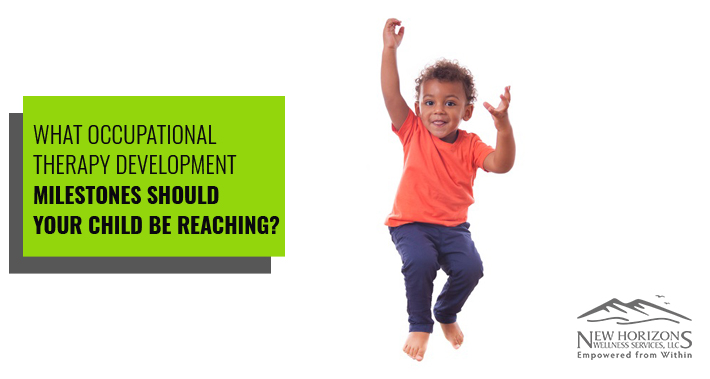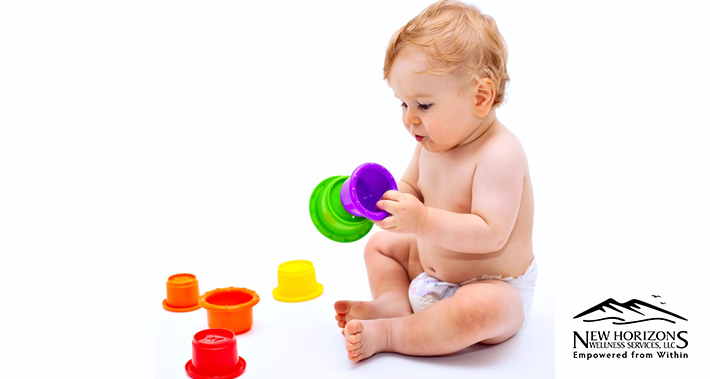
Occupational therapists use a variety of tools to help assess your child’s health. For instance, watching their developmental progress can help assess the need for occupational therapy for developmental delay. We call these developmental milestones. If your child is developing as expected, we say they’re meeting their developmental milestones. But what are these occupational therapy milestones?
They’re a set of expectations for typical childhood development. If your child isn’t meeting them, it may be a sign of potential developmental delays. That’s why it’s so important to be knowledgeable about what occupational developmental milestones to watch it for in your child.
We’re New Horizons Wellness Services, a clinic that provides pediatric occupational therapy in Tigard Oregon, and today we’d like to dive deeper into the topic of occupational therapy developmental milestones. Keep reading to find out more.
What Are Occupational Therapy Developmental Milestones?
Developmental milestones provide a rough timeline for your child’s skill learning. They help you understand which skill development to expect in your child as they age. Occupational therapy developmental milestones primarily involve your child’s fine motor skill development. These skills require the use of the small muscles that help you perform and coordinate movements between your hands, fingers, eyes, and much more.
In addition to fine motor skills, occupational therapy developmental milestones involve other skills. This includes visual motor skills like hand eye coordination. It also involves gross motor skills, such as running and jumping, and self care skills, such as dressing and feeding oneself. Through these developmental milestones, your child will learn how to:
● Bathe themselves
● Get dressed and undressed
● Tie their shoes
● Brush their teeth
● Feed themselves
● Wash their hands
● Hold objects
● And much more
What Are The Major Milestones Of Fine Motor Development In Early Childhood?
Fine motor development begins during early childhood and progresses as your child ages. Keep reading to find out which skill development you can watch out for in your child by age.
Skills Development For Three Month Old’s
By three months of age, your child should be able to:
● Grasp objects with their fingers (palmar grasp reflex, a primitive reflex)
● Lift and turn their head while on their belly
● Bear weight on their forearms
● Hold their head in line with the middle of their body
● Roll over from their back to their side
● Have no head lag when you pull them from a laying to sitting position
Some of these are related to what’s known as “primitive reflexes.” They’re reflexes that happen as automatic responses to what’s happening around an infant. Eventually, these reflexes will integrate as they meet further developmental milestones.
RELATED: What Is Primitive Reflex Integration?
Skills Development For Nine Month Old’s
By nine months of age, your child should be able to:
● Imitate scribbling with a pen or pencil
● Pick up small items using the pads of their thumb and forefinger (inferior pincer grasp)
● Track objects with their eyes as they move horizontally, vertically, and in a circular motion
● Crawl on their hands and knees
● Use furniture to stand upright and walk a few steps
● Stand unassisted for short periods of time
● Walk with assistance
● Drink from a straw
● Reach across their body to grab something (crossing the midline)
Skills Development For Twelve Month Old’s
By twelve months of age, your child should be able to:
● Play with toys at the middle of their body
● Point with their index finger
● Pick up small objects using the tips of their thumb and forefinger (refined pincer grasp)
● Scribble on paper
● Use a fisted grasp to hold writing utensils
● Climb stairs on their hands and knees
● Walk without assistance
● Climb down stairs backwards on hands and knees
● Squat to pick up toys
● Throw a ball
● Begin to use spoons and hold cups
● Help you as you dress them
● Tolerate bathing, diaper changes, and other grooming activities
● Indicate that their diaper is dirty
Skills Development For Eighteen Month Old’s
By eighteen months of age, your child should be able to:
● Play with both hands
● Turn the pages of a book
● Run (even if they do so stiffly)
● Walk up and down stairs while holding onto a railing
● Climb on jungle gyms, slides, and furniture
● Kick a ball forward
● Put on socks independently
● Push their arms and legs through holes of clothing
Skills Development For Two Year Old’s
By two years of age, your child should be able to:
● Draw vertical, horizontal, and circular shapes
● Complete a three piece insert puzzle
● Use safety scissors
● Hold a pencil properly (digital pronate grasp)
● Throw and kick a ball (though probably inaccurately)
● Jump down from a step
● Walk up and down stairs without support
● Catch large balls against their chest
● Ride a tricycle
● Use a spoon efficiently and begin to use forks
● Remove unfastened clothing
● Help with brushing teeth and bathing
● Begin to show interest in potty training
Skills Development For Two And A Half Year Old’s
By two and a half years of age, your child should be able to:
● String beads together
● Cut paper
● Use a fork efficiently
● Unbutton clothing
● Wash hands independently
● Indicate a need to use the bathroom and wipe after urinating

Skills Development For Three Year Year Old’s
By three years of age, your child should be able to:
● Cut in a straight line
● Draw a vertical line, horizontal line, and circle
● Walk up stairs with alternating feet
● Jump, climb, and run
● Jump with two feet off the floor
● Jump over objects
● Put on some clothing independently, such as shirt, shoes, and socks
● Go to the bathroom independently with or without assistance wiping after a bowel movement
Skills Development For Three And A Half Year Old’s
By three and a half years of age, your child should be able to:
● Cut a circle out of a sheet of paper
● Continue to learn how to properly hold a writing utensil
● Stand on one leg for five seconds
● Walk down stairs with alternating feet
● Throw a ball to hit a target
● Hop on one foot
● Use snaps, hooks, and zippers on clothing and dress themselves with supervision
Skills Development For Four Year Old’s
By four years of age, your child should be able to:
● Color within the lines
● Cut a square out of a piece of paper
● Copy lines, shapes, and some letters and numbers
● Complete puzzles up to ten pieces
● Jump forward
● Gallop
● Catch a ball with both hands without trapping it against their body
● Independently remove pullover clothes, buckle shoes and belts, and pull zippers
● Brush teeth with supervision
● Independently use the toilet and wash hands
Skills Development For Five Year Old’s
By five years of age, your child should be able to:
● Draw stick figures
● Complete puzzles up to twenty pieces
● Copy most letters and print their own name
● Stand on one foot for ten seconds
● Skip
● Kick with accuracy
● Tie knots on clothing
● Brush teeth and groom without supervision
Skills Development For Six Year Old’s
By six years of age, your child should be able to:
● Cut a variety of shapes out of paper
● Run with speed and endurance
● Jump, hop, and skip for long distances
● Throw a ball at long distances
● Catch a ball with accuracy
● Use a knife effectively
● Tie their shoes
What Causes Poor Fine Motor Skills In Children?
If your child is struggling with their fine motor skills it could be due to a variety of reasons. This may include:
● ADHD
● Being born premature
● A developmental disability
● A neurological issue
● Certain illnesses
Speak to your child’s occupational therapist to explore the causes behind your child’s fine motor skills delay.
What Happens If A Child Does Not Develop Fine Motor Skills?
We use our fine motor skills for a wide variety of everyday activities. Therefore, children struggling with their fine motor development may also struggle with everyday tasks such as:
● Getting Dressed
● Eating independently
● Writing
● Using a computer
● Grooming and washing efficiently
If your child is a couple weeks behind, it’s really not cause for alarm. This is especially true if they’re showing progress toward their milestones. But if the time has long passed and they aren’t making any progress, it’s a good idea to…
Book Your Appointment With New Horizons Wellness Services Today
At New Horizons Wellness Service, we know the importance of early identification for developmental delays. Early identification and treatment for developmental delay will help to ensure your child gets back on track with their peers. Book your appointment with New Horizons Wellness Services today.

Yours in Health,
New Horizons Wellness Services13333 SW 68th Pkwy,
Tigard, OR 97223
- https://g.page/newhws
New Horizons Wellness Services provides a true multidisciplinary approach to mental & physical health treatments for children, adults and families.